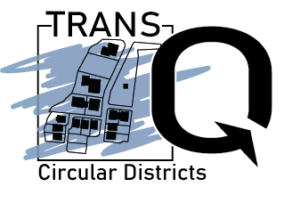Circular Districts
Transformation of neighborhoods into a climate-neutral circular economy
- Funding: WISS Förderung 2021 | Land Salzburg
- Lead Partner Organisation: FH Salzburg
- Associated Research Partner: Christine Vallaster, Paris Lodron Universität Salzburg
- Project mamagement: FH-Prof. DI (FH) Dr. Stefan Netsch, M.Eng.(Department Green Engineering and Circular Design)
- Team at FH Salzburg: FH-Prof. DI (FH) DI Dr. Georg Brunauer, DI Leonhard Eitzinger-Lange, Shuk King Stephanie Chan, B.Eng., MSc, MSc (Department Green Engineering and Circular Design), Philip Lechner, B.A. (Department Business and Tourism)
- Project partners: PEC Pongauer Energie Center GmbH Salzburg AG
- Project duration: 02/2023 – 02/2024

Cities and villages play an important role in societal transformation towards resource conservation and climate neutrality. By organizing into individual neighborhoods, the interdependencies of various actors (local politics and administration, energy providers, urban planning, local economy, and population) and infrastructure systems become particularly effective. However, in practice, planning ambitions are not always coherent due to the differing interests of stakeholder groups. The transition to an energy-autonomous circular economy at the neighborhood level requires the development of an integrated overall plan that involves neighborhood stakeholders in the transformation of local infrastructure systems and takes their interests into account.
The main research question of this project is therefore:
What are the determinants for a successful transformation of neighborhoods towards energy autonomy within the framework of the circular economy?
In cooperation with Salzburg AG and PEC, as well as three spatially different neighborhoods from the state of Salzburg, actors of the infrastructure systems are networked and their interests disclosed. Based on this, these infrastructure systems are adapted in a planning manner, and a specific governance process for implementation is developed according to the spatial situation. The participatory and integrative nature of this process, enabled through workshops and information units, helps to increase societal acceptance for a transformation towards sustainable living.
This project is associated with building competence in the state of Salzburg in the field of urban development towards a climate-neutral circular economy, contributing to the topic of ‘Green Transition’.
The project is implemented through cooperative collaboration between the Smart Cities (SMC) and Business Administration (BWI) programs at FH Salzburg, the Marketing unit from the Department of Business Administration at Paris Lodron University Salzburg (PLUS), and the cooperation partners PEC and Salzburg AG.
Three neighborhoods are selected, which differ in their spatial situation (size and associated infrastructure). This organization into three spatially different situations makes it possible to illustrate the differences in the context of societal change towards climate neutrality and resource conservation (e.g., inner development, densification, and spatial indicators for assessing location quality, especially regarding energy production, storage, and consumption). The three chosen locations are exemplary of the current dynamic development of settlement structures, which are characterized by changes in housing forms and mobility types.
Results of this project can be found in this report!




